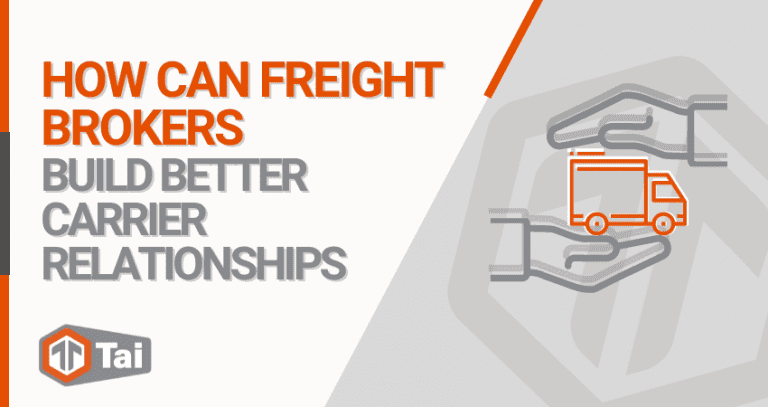Freight brokers are in constant contact with carriers that provide the trucks that pick up freight from warehouses and deliver them to its final destination. The benefits of building strong relationships with carriers include increased loyalty, faster rate negotiation, and enhanced service.
Brokers should focus on building trust by listening to their carrier’s needs; standing out from the competition through innovative service; honoring commitments; being respectful; mindful of other time zones when communicating via email or phone call outside business hours; transparent about any changes in rates or discounts offered to specific customers (which may be contingent upon volume); and pay on time.
Here is a detailed overview of managing carrier relationships and how they can benefit your brokerage business.
Benefits of Strong Carrier Relationships
In the freight brokerage market, there are two customer types. On one side, shippers are looking for a truck to transport their goods. On the other side, carriers are looking for loads to make money. For brokers, it is often easy to overlook the fact that carriers are customers too, and should be treated as such.
A well-developed relationship with certain carriers can come with the following advantages:
- Increased loyalty – When carriers feel good about working with a broker, they are more likely to work exclusively with them in return. Increased loyalty leads to repeat business, which can drastically reduce your time looking for trucks to haul freight from its origin to destination.
- Improved negotiation – Freight brokerage companies that have built strong relationships with carriers are likely to find themselves in an advantageous position during negotiations. Carriers will be willing to lower their rates or offer other discounts for specific loads if it means being assigned more business by a broker they appreciate working with.
- Enhanced service – Carriers are less likely to cancel loads or delay pick-ups when they have built a strong relationship with their broker because carriers know they can count on them. Carriers are also more likely to offer help if needed, such as with heavy loads or a difficult pick-up location; quick contact by email or phone call outside of usual business hours is also useful in this situation.
Build Trust
One of the most significant ways of building good relationships with carriers is by listening to their needs and concerns. Carriers may be hesitant about working with a broker if they feel that the latter doesn’t understand them, so it is critical to engage in dialogue from time to time.
Here are some tips on how freight brokers can build trust with carriers:
- Listen – Don’t interrupt. Instead of thinking about what you want to say next, make sure you listen and pay attention when your carriers talk. Brokers must demonstrate active listening skills during their conversations with carriers.
- Be mindful of their time zone – It is essential to be respectful and mindful of time zones outside of your own when communicating via email or phone call outside business hours.
- Be transparent – Make sure you’re always upfront and straightforward when communicating the terms of the business relationship, so carriers know what to expect from you. If there are any changes or cancellations, provide your carrier with as much notice in advance as possible. It is also important to be transparent about any rate or discount changes offered to specific customers.
- Honor commitments – When it comes to freight broker and carrier relationships, the golden rule is that if something is promised, it must be fulfilled. If you make a mistake, offer to take responsibility for it and do everything in your power to rectify the situation.
Stand Out From The Competition
Freight brokers are in a highly competitive industry. Because there is always someone willing to do the same job for less money (and sometimes even free), your brokerage business must stand out to earn the trust of carriers.
Consider what your competitors have to offer and how your company differs. Do you offer faster service? How about higher payouts for the same amount of work? How are you better at communicating with carriers compared to your competitors?
Make sure that when you communicate with carrier representatives, they know precisely why working with you is a better option than any other broker.
You can also consider offering carriers benefits outside of the freight industry, such as discounts at certain restaurants or coupons for gas. Carriers are more likely to work with you if they feel that you genuinely care about them and their well-being.
Be Thankful
Freight carriers rarely get thanked for their hard work, which is why it’s essential to let them know that you appreciate all they do. The more gratitude the broker shows towards carriers, the higher the chance of lasting business relationships.
There are many ways brokers can show this appreciation:
- Thanking your carrier publicly on social media – this will make other carriers aware of your appreciation for their work, and it might make them more inclined to accept future business opportunities with you.
- Expressing gratitude through emails or phone calls
- Offering unique gifts – Something as simple as a Starbucks gift card or delicious treats from local bakeries can go a long way because it shows that you’re thankful and thoughtful.
The bottom line is this: if brokers want to build better relationships with their carriers, they need to express gratitude for all the hard work that goes into every shipment.
Pay On Time
Fast payment is another crucial aspect of any successful business relationship because carriers are more likely to work with brokers who pay them on time.
How can freight brokers ensure that they’re always able to make timely payments?
The most effective way is by setting up accurate bookkeeping records and financial budgets for their businesses to prevent overspending (spending more money) than the brokerage has.
Another way to ensure that carriers get paid on time is by setting up an automated billing system. This will save brokers a considerable amount of time and ensure that invoices are sent out according to schedule to be processed and paid in full without any delays.
Communicate
Finally, in any relationship – even a business one – communication is key. No matter your company’s relationship with carriers, it’s essential to keep the lines of communication open.
It can’t be stressed enough how valuable this aspect of business relationships is: without effective communication, there won’t be any trust between two parties, which means no loyalty or rapport, which are integral parts of building strong business connections.
So regardless of what is happening with your business or loads – if they are on time, delayed, canceled, or changed, make sure to let your carriers know as soon as possible.
After all, they are the ones that will be immediately affected by these changes and who would much rather hear it from you, rather than from a third party source. Don’t keep carriers in the dark about what happens with their shipments – this sort of uncertainty can lead to a loss of trust, which is never good for business.
Don’t Shy Away From Technology
Lastly, technology has made communication faster and more efficient. The trucking industry might have been a bit slow on the uptake – after all, a conversation and a phone call are still largely valued above anything else. However, an unprecedented event such as the COVID-19 pandemic has forced carriers and brokers to fully digitize their business processes and embrace the benefits of modern technology.
Carriers now have access to a variety of technologies that help them communicate more efficiently, while brokers can utilize apps to stay on top of their shipments – no matter where they are or what time it is.
For example, a good CRM system could effortlessly connect carriers with loads. It could allow brokers to help carriers with gaps in back hauls and freight that the carriers have marked as their pain points. This could help brokers provide a better service and win the loyalty of their carriers.
Technologies such as machine learning, artificial intelligence, and data integration allows brokers to collect and analyze data more quickly than ever before. Keeping track of important information such as shipment performance, service records, carrier contact details, customer preferences – all this can be done as easily as looking it up on an app. It also leaves more time for brokers to focus on their relationships with carriers and developing better business practices.
Conclusion
The freight brokerage industry is built on relationships, and it’s important to be mindful of that fact when cultivating a network of carriers.
By focusing on building trust, listening, standing out from the competition, honoring commitments, being respectful, mindful, and transparent – brokers will significantly improve their chances of strengthening relationships with freight carriers.
Keeping the lines of communication open with your carriers at all times will help you avoid any misunderstandings or confusion – this way, there won’t be any doubts about how shipments are handled by each party involved.
In the current 2021 capacity shortage, carriers are looking for new partners they can work with more closely, and building better relationships will allow brokers to be trusted allies.
Finally, automating billing and bookkeeping systems can help brokers save time and ensure that carriers get paid on time, a valuable aspect of every relationship.
If you’d like some help in automating your freight brokerage business, please contact Tai Software. Our systems are built for freight brokerage companies just like yours.










